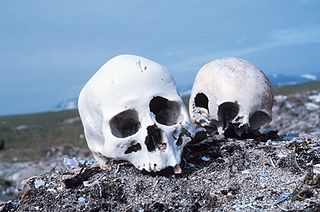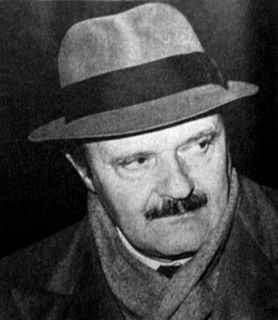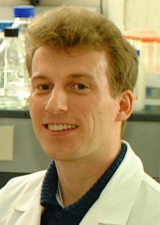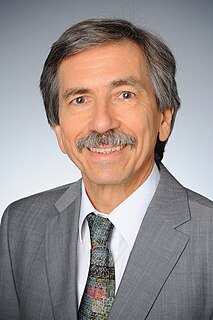Related Research Articles

DNA profiling is the process of determining an individual's DNA characteristics. DNA analysis intended to identify a species, rather than an individual, is called DNA barcoding.

Forensic science, also known as criminalistics, is the application of science to criminal and civil laws, mainly—on the criminal side—during criminal investigation, as governed by the legal standards of admissible evidence and criminal procedure.

Roberto Calvi was an Italian banker, dubbed "God's Banker" by the press because of his close association with the Holy See. He was a native of Milan and was Chairman of Banco Ambrosiano, which collapsed in one of Italy's biggest political scandals.
DNA paternity testing is the use of DNA profiles to determine whether an individual is the biological parent of another individual. Paternity testing can be especially important when the rights and duties of the father are in issue and a child's paternity is in doubt. Tests can also determine the likelihood of someone being a biological grandparent. Though genetic testing is the most reliable standard, older methods also exist, including ABO blood group typing, analysis of various other proteins and enzymes, or using human leukocyte antigen antigens. The current techniques for paternity testing are using polymerase chain reaction (PCR) and restriction fragment length polymorphism (RFLP). Paternity testing can now also be performed while the woman is still pregnant from a blood draw.

Albert Henry DeSalvo was an American rapist and serial killer in Boston, Massachusetts, who purportedly confessed to being the "Boston Strangler," the murderer of thirteen women in the Boston area from 1962 to 1964. In 1967, DeSalvo was imprisoned for life for committing a series of rapes. However, his murder confession has been disputed and debate continues as to which crimes he actually committed.
Innocence Project, Inc. is a 501(c)(3) nonprofit legal organization that is committed to exonerating individuals who have been wrongly convicted, through the use of DNA testing and working to reform the criminal justice system to prevent future injustice. The group cites various studies estimating that in the United States between 1% and 10% of all prisoners are innocent. The Innocence Project was founded in 1992 by Barry Scheck and Peter Neufeld who gained national attention in the mid-1990s as part of the "Dream Team" of lawyers who formed part of the defense in the O. J. Simpson murder case.
Samuel Holmes Sheppard, D.O. was an American neurosurgeon. He was exonerated in 1966, having been convicted of the 1954 murder of his wife, Marilyn Reese Sheppard. The case was controversial from the beginning, with extensive and prolonged nationwide media coverage.
Genetic genealogy is the use of genealogical DNA tests, i.e., DNA profiling and DNA testing, in combination with traditional genealogical methods, to infer genetic relationships between individuals. This application of genetics came to be used by family historians in the 21st century, as DNA tests became affordable. The tests have been promoted by amateur groups, such as surname study groups or regional genealogical groups, as well as research projects such as the Genographic Project.
Forensic identification is the application of forensic science, or "forensics", and technology to identify specific objects from the trace evidence they leave, often at a crime scene or the scene of an accident. Forensic means "for the courts".
A ringtest for quality management is part of an external quality assurance programme for a measuring method. Ringtest is also called proficiency test or interlaboratory test. Usually a reference institute sends identical samples which have to be analyzed for special parameters to different laboratories. The industrial, medical or research laboratory gets a limited time with a deadline to send in the analysis results. The statistical evaluation and interpretation of the laboratories’ results is a great help for all participating labs as it opens the possibility to assess the quality of their analysis compared to other laboratories. Participation in ringtests is obligatory for accredited laboratories. Nevertheless, non-accredited laboratories can also take part in ringtests.
Wrongful execution is a miscarriage of justice occurring when an innocent person is put to death by capital punishment. Cases of wrongful execution are cited as an argument by opponents of capital punishment, while proponents say that the argument of innocence concerns the credibility of the justice system as a whole and does not solely undermine the use of death penalty.

FamilyTreeDNA is a division of Gene by Gene, a commercial genetic testing company based in Houston, Texas. FamilyTreeDNA offers analysis of autosomal DNA, Y-DNA, and mitochondrial DNA to individuals for genealogical purpose. With a database of more than two million records, it is the most popular company worldwide for Y-DNA and mitochondrial DNA, and the fourth most popular for autosomal DNA. In Europe, it is the most common also for autosomal DNA. FamilyTreeDNA as a division of Gene by Gene were acquired by MYDNA, Inc., an Australian company in January 2021.

Cedric Keith Simpson was an English forensic pathologist. He was Professor of Forensic Medicine in the University of London at Guy's Hospital, Lecturer in Forensic Medicine at the University of Oxford and a founding member and President of the Association of Forensic Medicine. Simpson became renowned for his post-mortems on high-profile murder cases, including the 1949 Acid Bath Murders committed by John George Haigh and the murder of gangster George Cornell, who was shot dead by Ronnie Kray in 1966.
Conviction for murder in the absence of a body is possible. However, cases of this type have historically been hard to prove, often forcing the prosecution to rely on circumstantial evidence, and in England there was for centuries a mistaken view that in the absence of a body a killer could not be tried for murder. Developments in forensic science in recent decades have made it more likely that a murder conviction can be obtained even if a body has not been found.

Amanda Marie Knox is an American author, activist, and journalist. She spent almost four years in an Italian prison following her wrongful conviction of the 2007 murder of Meredith Kercher, a fellow exchange student with whom she shared an apartment in Perugia. In 2015, Knox was definitively acquitted by the Italian Supreme Court of Cassation.

Tirath Das Dogra is an Indian forensic pathologist and former Pro-Chancellor and vice-chancellor of SGT University, Budhera Gurgaon Haryana 2013–2017. He is a former director of the All India Institute of Medical Sciences (AIIMS) New Delhi and an authority on forensic medicine. Dogra been member of the Medical Council of India from December 2013 till its dissolution in September 2018. Dogra have been President of National Medicos Organisation Delhi State from 2012 to 2017. Dogra was member of TEQ-Equivalence Committee and Administration and Grievance committee of Medical Council of India. He is member of Advisory committee on MOOC's program of University Grants Commission of India New Delhi. Presently he is emeritus professor of forensic medicine and forensic sciences, professor of Andragogy and educational philosophy and Advidsor, Internal Quality Assurance Cell (IQAC) at SGT University Gurgaon. Prof. T D Dogra is member of Rehablitation Council of India.
GEDNAP is the acronym for German DNA Profiling and was used in the early nineties in analogy to EDNAP (European DNA Profiling, a working group of the International Society for Forensic Genetics for the first time in the course of the proficiency tests organized by the German Stain Commission, a Joint Commission of University Institutes of Legal Medicine and Police Institutes of Forensic Sciences in Germany.

The International Society for Forensic Genetics – ISFG is an international non-profit scientific society founded in 1968. The main goal of the society is to advance the field of forensic genetics, also termed DNA profiling, through dissemination of scientific results and opinions, communication amongst scientists and education. The bi-annual international ISFG congresses, international workshops and seminars, the society’s scientific journal, and the scientific recommendations on current topics all work towards this goal. The society’s website contains up to date information on all activities.

Peter Forster FRSB is a geneticist researching the prehistoric origins and ancestry of mankind. In addition to archaeogenetics, he has published on the reconstruction and spread of prehistoric languages and in the field of forensic genetics.

Peter Matthias Schneider is a German forensic geneticist. He is a full professor at the Institute of Legal Medicine of the University of Cologne.
References
- ↑ "Leopoldina: List of Members" . Retrieved 1 February 2013.
- ↑ "New tests 'say Calvi was murdered'". BBC. 19 April 2002. Retrieved 1 February 2013.
- ↑ "New inquiry in Italian banker's death". BBC. 30 September 2003. Retrieved 1 February 2013.
- ↑ Daley, Suzanne (20 April 2000). "Genetics Offers Denouement To Mystery of Prince's Death". The New York Times . Retrieved 1 February 2013.
- ↑ Labi, Nadya (May 1, 2000). "Requiem for a Dauphin". Time . Archived from the original on November 22, 2010. Retrieved 1 February 2013.
- ↑ Rückert, Sabine (27 January 2005). "Sieg des Rechts". Die Zeit (in German). Retrieved 1 February 2013.
- ↑ "Gericht lehnt den Gutachter von Kachelmann ab". Die Welt (in German). 7 October 2010. Retrieved 1 February 2013.